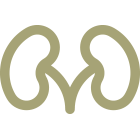Unfortunately, it’s hard to tell which condition comes first in many patients: high blood pressure or kidney disease. Since either can lead to the other, getting a handle on high blood pressure early may help minimize your risk of kidney disease.
Certain drinks can create bodily dysfunction if consumed on a regular basis. They happen to be the most popular drinks, such as sugary sodas and coffee. These fluids actually flush out nutrients needed to keep the body healthy.
Have you been hesitant to set an appointment with a nephrologist because you don’t want to find out there’s an issue with your kidneys? Remember, putting off your appointment could allow your kidneys to get worse.
A common disorder that nephrologists treat is acute renal failure. Renal refers to the kidneys and acute means sudden, so this is when the kidneys fail without warning. This is often caused by a toxin or by blood loss. If treated quickly and correctly, the kidneys can sometimes recover completely from acute renal failure.
Do you know what steps you can take to ensure the health of your kidneys? One of the things you can do is stick to a diet high in carbohydrates and low in protein. Protein is the main source of waste products, so this reduces your kidneys’ workload.
Unfortunately, many Americans are forced to take some sort of pain medication daily to manage various conditions. If you’re on a pain medication regimen, let’s discuss how it might be affecting your kidneys.
When undergoing dialysis, it’s recommended that you have your blood work frequently assessed to evaluate the effectiveness of the treatments. This way, we can calculate the reduction of toxins removed from your blood to ensure that you are getting the ideal amount of treatment.
It is an unfortunate fact that many medicines, both prescription as well as over-the-counter, can cause kidney impairment. If you have kidney disease or a history of kidney illness, then consult your nephrologist, as certain medicines can build up inside the body and make things worse.
When dealing with kidney disease, an exercise program approved by your doctor can make a big difference. Not only will this increase strength and endurance, but it can prevent fatigue and reduce stress and depression.
Continuous Ambulatory Peritoneal Dialysis (CAPD) can be convenient for people with busy schedules. You can do it at home or at work without a machine, so it benefits patients who need to go about their usual activities each day.
Bacterial endocarditis is characterized by a bacterial infection within the tissues of the heart. The renal lesions that subsequently form are related to immune response and kidney damage and sometimes result in chronic kidney disease.
Did you know that kidney failure can be caused by sepsis in the body? Here, the body’s immune system becomes overwhelmed by infection, resulting in inflammation and eventually complete shutdown of the kidneys.
If your nephrologist determines you need dialysis, you will be recommended either hemodialysis or peritoneal dialysis. Hemodialysis is when the blood is removed from the body and filtered through a machine. Peritoneal dialysis works by injecting a blood-cleaning solution into the body and then draining it.
Sometimes, a patient might wonder why he or she has been referred to a nephrologist (kidney doctor) when he or she isn't having any symptoms of kidney problems. Unfortunately, people who contract chronic kidney disease, or CKD, often don't know anything is wrong until dialysis is necessary. Trust your doctor, and see the specialist when recommended.
How can your nephrologist determine if you have the onset of chronic kidney disease? Early kidney disease is similar to high blood pressure in that it generally exhibits no symptoms. Your nephrologist can measure the glomercular filtration rate, which analyzes how effectively the kidneys are removing waste from the blood.
Non-steroidal anti-inflammatory drugs (NSAIDs) can be dangerous to those with high blood pressure or diabetes. In fact, if you have hypertension or a family history of hypertension or diabetes, NSAIDs like ibuprofen and many cold medicines can be dangerous, as they reduce blood flow to your kidneys.
What are the major symptoms of chronic kidney disease? Experts say it isn’t uncommon for a patient to be free of any significant symptoms in the early stages of CKD. Some early symptoms include fatigue, difficulty concentrating, poor appetite, low energy levels, and swollen feet and ankles.
While many people are referred to a nephrologist when their primary care doctor suspects a kidney problem, most nephrologists also see patients who come to them directly. Either way, the first step will be a series of tests to diagnose the exact problem that you're having.
Perhaps the scariest point in anyone’s life is when their doctor tells them they don’t know what’s wrong, but that it could be a serious issue with their kidneys. If you’re ready to find out what’s really going on inside your body, we’re always here for you.
Did you know that drinking milk can be harmful if you are experiencing kidney failure? The excess calcium needs to be excreted through your urine, and this can lengthen the filtration process that your kidneys perform.
There are many types of polycystic kidney disease. The three main types are: Autosomal Dominant PKD, Infantile or Autosomal Recessive PKD and Acquired Cystic Kidney Disease.
Renal artery thrombosis is a kidney disease that is characterized by a formation of a clot in a renal artery. Renal artery thrombosis can cause kidney failure due to the blood clot blocking the flow of blood to the kidney.
Can any relative donate a kidney to me? Your nephrologist will be looking for the best possible match before moving forward with a transplant. Experts say that is most commonly seen from brothers or sisters; however, it is possible someone on the national registry will be an excellent match as well.


